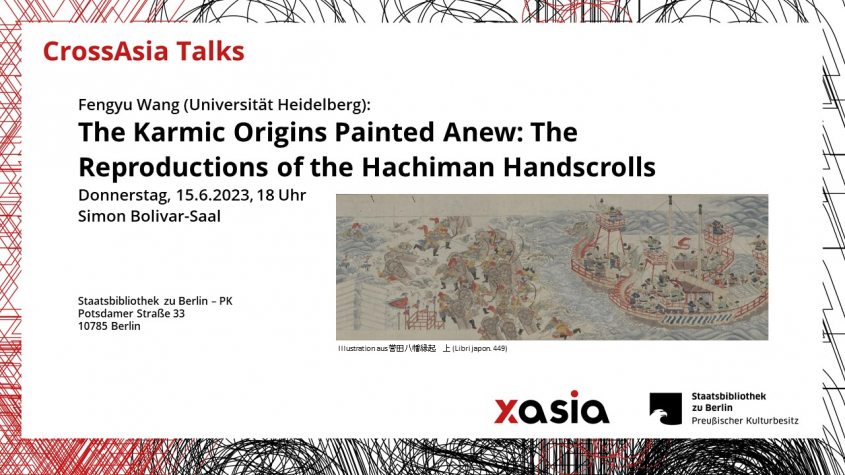The Karmic Origins Painted Anew: The Reproductions of the Hachiman Handscrolls
(See English below)
Wir freuen uns sehr Ihnen den Vortrag von Herrn Fengyu Wang (Universität Heidelberg) am 15.6.2023 ab 18 Uhr im Simon Bolivar-Saal (Potsdamer Straße 33, 10785 Berlin) zum Thema „The Karmic Origins Painted Anew: The Reproductions of the Hachiman Handscrolls“ ankündigen zu dürfen.
Hachiman engi 八幡縁起 or The Karmic Origins of Hachiman, narrates Empress Jingū’s 神功皇后mythical conquest of Korea, the birth of her son, Emperor Ōjin 応神天皇, and his miraculous manifestations as the deity Hachiman, literally “eight banners.” As the Hachiman veneration became widespread since the late thirteenth century, illuminated handscrolls of his inception legend were reproduced and dedicated to the newly founded Hachiman-gū Shrines across the country. The set of two scrolls in the Staatsbibliothek zu Berlin collection, titled Konda Hachiman engi 誉田八幡縁起 or The Karmic Origins of the Konda Hachiman, is an eighteenth-to-nineteenth-century copy of a 1433 version of Hachiman scrolls. The latter was itself one of the three sets of Hachiman handscrolls that the sixth Ashikaga shogun Yoshinori 足利義教 (1429–1441) newly commissioned in the same year, as part of his grandiose project of Hachiman veneration. The practices of making copies and reproductions were a prominent feature in the developments of the Hachiman handscrolls, where devotional, socio-political, and aesthetic values were imbued into the newly created versions. This talk will examine the Berlin set of Hachiman handscrolls and its 1433 original in the larger context of reproducing Hachiman engi.
The Berlin set was one of seven other versions of Hachiman scrolls investigated by the 2015 Hachiman Digital Handscrolls Project at Heidelberg University. It is now also available on the newly designed interface of the Japanese Handscrolls project of the Staatsbibliothek zu Berlin.
Die Vortragssprache ist Englisch. Wir bitten Sie um Voranmeldung für den Vortrag unter: ostasienabt@sbb.spk-berlin.de und eine kurze Mitteilung falls Sie einen barrierefreien Zugang benötigen. Die Veranstaltung wird gefilmt.*
Der Vortrag wird darüber hinaus via Webex gestreamt und aufgezeichnet. Sie können am Vortrag über Ihren Browser ohne Installation einer Software teilnehmen. Klicken Sie dazu unten auf „Zum Vortrag“, folgen dem Link „Über Browser teilnehmen“ und geben Ihren Namen ein.
Alle bislang angekündigten Vorträge finden Sie hier. Die weiteren Termine kündigen wir in unserem Blog und auf unserem Twitteraccount an.
—
We are very pleased to announce the lecture of Mr. Fengyu Wang (University of Heidelberg) on 15.6.2023 from 6 pm in the Simon Bolivar-Saal (Potsdamer Straße 33, 10785 Berlin) on the topic „The Karmic Origins Painted Anew: The Reproductions of the Hachiman Handscrolls„.
Hachiman engi 八幡縁起 or The Karmic Origins of Hachiman, narrates Empress Jingū’s 神功皇后mythical conquest of Korea, the birth of her son, Emperor Ōjin 応神天皇, and his miraculous manifestations as the deity Hachiman, literally “eight banners.” As the Hachiman veneration became widespread since the late thirteenth century, illuminated handscrolls of his inception legend were reproduced and dedicated to the newly founded Hachiman-gū Shrines across the country. The set of two scrolls in the Staatsbibliothek zu Berlin collection, titled Konda Hachiman engi 誉田八幡縁起 or The Karmic Origins of the Konda Hachiman, is an eighteenth-to-nineteenth-century copy of a 1433 version of Hachiman scrolls. The latter was itself one of the three sets of Hachiman handscrolls that the sixth Ashikaga shogun Yoshinori 足利義教 (1429–1441) newly commissioned in the same year, as part of his grandiose project of Hachiman veneration. The practices of making copies and reproductions were a prominent feature in the developments of the Hachiman handscrolls, where devotional, socio-political, and aesthetic values were imbued into the newly created versions. This talk will examine the Berlin set of Hachiman handscrolls and its 1433 original in the larger context of reproducing Hachiman engi.
The Berlin set was one of seven other versions of Hachiman scrolls investigated by the 2015 Hachiman Digital Handscrolls Project at Heidelberg University. It is now also available on the newly designed interface of the Japanese Handscrolls project of the Staatsbibliothek zu Berlin.
The lecture will be held in English. We kindly ask you to register in advance at: ostasienabt@sbb.spk-berlin.de, and to let us know if you need barrier-free access. The event will be filmed.*
The lecture will also be streamed and recorded via Webex. You can take part in the lecture using your browser without having to install a special software. Please click on the respective button “To the lecture” below, follow the link “join via browser” (“über Browser teilnehmen”), and enter your name.
You can find all previously announced lectures here. We will announce further dates in our blog and on Twitter.



